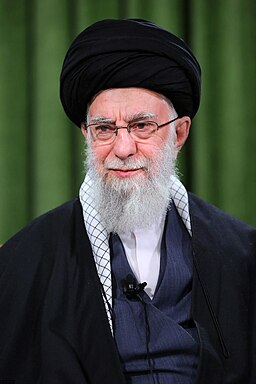Foreign policy is conventionally thought to be of minor concern to voters in US presidential elections. That may not be the case.


The Mideast is one region where the foreign policies of President Biden and former President Trump have differed greatly. President Biden seeks an alliance with Iran at the expense of Israel and at first, Saudi Arabia and the Gulf States. Trump did the opposite, allied with Saudi Prince Mohammed bin Salman and fostered an Israel-Arab alliance and the Abraham Accords.
by Richard A. Schulman
Foreign policy is conventionally thought to be of minor concern to voters in US presidential elections. Both major candidates, Donald Trump and Joe Biden, avoided debates on defense and foreign policy, indeed on any policy matters, during the primaries.
“[T]he role that foreign policy plays in presidential politics generally has less to do with voters’ policy preferences than with their beliefs about which leaders have the right personal attributes to serve as a competent commander-in-chief,” Jeffrey Friedman, professor of government at Dartmouth College, writes. “[D]ata show that voters are roughly three times as likely to cite leaders’ personal traits as reasons to think they would do a good job of handling international affairs as opposed to praising or critiquing their stances on individual policy issues…. This pattern does not bode well for President Joe Biden… Trump’s reputation for combativeness insulates him against perceptions of being a weak leader.”
Should war break out, bad foreign policy and defense choices by the next president will profoundly affect voters not only through inflation, taxes, debt, and reduced availability of consumer goods but could even jeopardize their physical existence. That is a real danger, given the multiple crises that have erupted during the Biden administration and the perception that it is adrift as to how to handle them. Ironically, Trump’s admiration for autocrats could strengthen the perception of him as a strong commander-in-chief in a world increasingly convinced that the US is a declining power.
Some of Trump’s advisors
It’s useful to look at the views of the foreign-policy community surrounding each candidate. The views of the community surrounding Trump are suggested by a RealClear Politics report on the “What a Foreign Policy for the Middle Class Looks Like” conference, which featured speeches from members of the “American First” faction of the Republican Party. Included were Sen. J.D. Vance, Sen. Rand Paul and Vivek Ramaswamy.
According to the report, Vance started the conference by asking, “‘What are the fruits of the last 40 years of American foreign policy? Of course, it’s disaster in Iraq. It’s a disaster in Afghanistan and Syria. It’s (a disaster) in Lebanon.’” He also included the current war in Ukraine.
Paul addressed foreign aid, emphasizing that “he believes foreign aid should always come with conditions” and questioning “the effectiveness of sanctions,” the report added.
Ramaswamy lobbied for decreasing U.S. aid, except to Taiwan because of their high production of “semiconductors that power most electronics,” but he “clarified that when the U.S. has ‘achieved semiconductor independence,’ he believes the U.S. should be willing to defend Taiwan less.”
The Wall Street Journal criticized Ramaswamy for this stance, writing that “abandoning Taiwan would be tantamount to abandoning the Western Pacific and betraying Japan” and “giving Xi a calendar date to invade.”
Isolationism
Isolationism has a long tradition among the “America First” hard right, as well as its admiration for dictators. This background is described in Arch Puddington’s review of Jacob Heilbrunn’s book, America Last: The Right’s Century-Long Romance with Foreign Dictators. After reviewing the antisemitic, eugenicist, pro-Nazi and pro-Mussolini isolationism of the Republican far-right during the 1930s, Puddington proceeds to the views of Trump and his circle following the Russian invasion of Ukraine:
“For starters, Donald Trump called Putin’s diplomatic moves ‘smart’ and ‘genius.’ Lieutenant General Michael Flynn, Trump’s one-time national security adviser, defended Putin entirely, as did longtime Putin admirer Pat Buchanan. Rod Dreher, an informal liaison between Hungarian Prime Minister Viktor Orbán and American conservatives, wrote that he ‘adamantly’ opposed ‘boys from Louisiana and Alabama risking their lives to make the Donbas safe for genderqueers and migrants.’ Tucker Carlson predicted that Americans would be poorer because of the Biden Administration’s Kyiv support….”
Puddington’s review notes that “Heilbrunn can’t bring himself to acknowledge that it was during the Reagan Administration that right-wing dictators were toppled throughout Latin America and Asia.” But Reagan was a conservative Republican, a Friedrich Hayek-influenced classical liberal, not a supporter of the far Right, which now disparages him.
Biden’s policy choices
Is Biden a superior choice? His advisors are Obama holdovers who encouraged Biden’s current policy failures: Secretary of State Anthony Blinken, National Security Jake Sullivan, Treasury Secretary Janet Yellin, and John Kerry and John Podesta, former and present presidential advisors on climate. They support the continuing, failed Obama policy of courting and bribing Iran, trying to topple Israeli prime minister Benjamin Netanyahu, and the earlier policy of insulting Prince Mohammed bin Salman, de facto ruler of Saudi Arabia. Biden fled Afghanistan precipitously, causing America’s enemies and even US allies to regard the US henceforth with contempt. Biden has been supporting Ukraine in a fearful manner that has resulted in the death of part of the at least one hundred thousand Ukrainian civilian and military deaths so far. In early 2022, this war could have been deterred or won if Biden not let Putin know that he would not be opposed by the US if he invaded Ukraine, and after Putin did just that, Biden repeatedly held back arms out of timidity and the advice of his Obama-administration-inherited advisors.
Meanwhile, the Biden administration has been refusing to pursue a needed US military buildup to counter China, Russia, and Iran. It prefers wasting hundreds of billions of taxpayer dollars on strategically counterproductive and scientifically unjustified green pork barrel projects. Meanwhile, the flood of illegal immigrants through the US southern border is also a foreign policy disaster for which Biden is to blame.
Trump’s policy choices
By contrast, Trump and his administration strongly opposed Iran, encouraged the Abraham Accords, didn’t wreck Mideast policy, supported all-out US energy production to lower the price of fossil fuels worldwide, and made an effort to reduce illegal immigration instead of throwing open the border as Biden did. Former Attorney General William Barr and others make a good case that it is Biden and his hard-left supporters, not Trump, who are the greater threat to democracy. Thus, the country arguably will be better off if Trump, 2024’s “lesser of two evils,” wins the November election.
Nevertheless, after the election, there will be good reason to support the building of a new third party to supersede the Trump-dominated Republican Party — disliked, for cause, by independents and a considerable fraction of Republicans. The desired replacement would be a classical-liberal party like the US enjoyed under Presidents George Washington, John and John Quincy Adams, Abraham Lincoln, Calvin Coolidge, and Ronald Reagan. While defense and foreign policy are only part of the President’s constitutional duties, they are the most important ones.

Leave a Reply